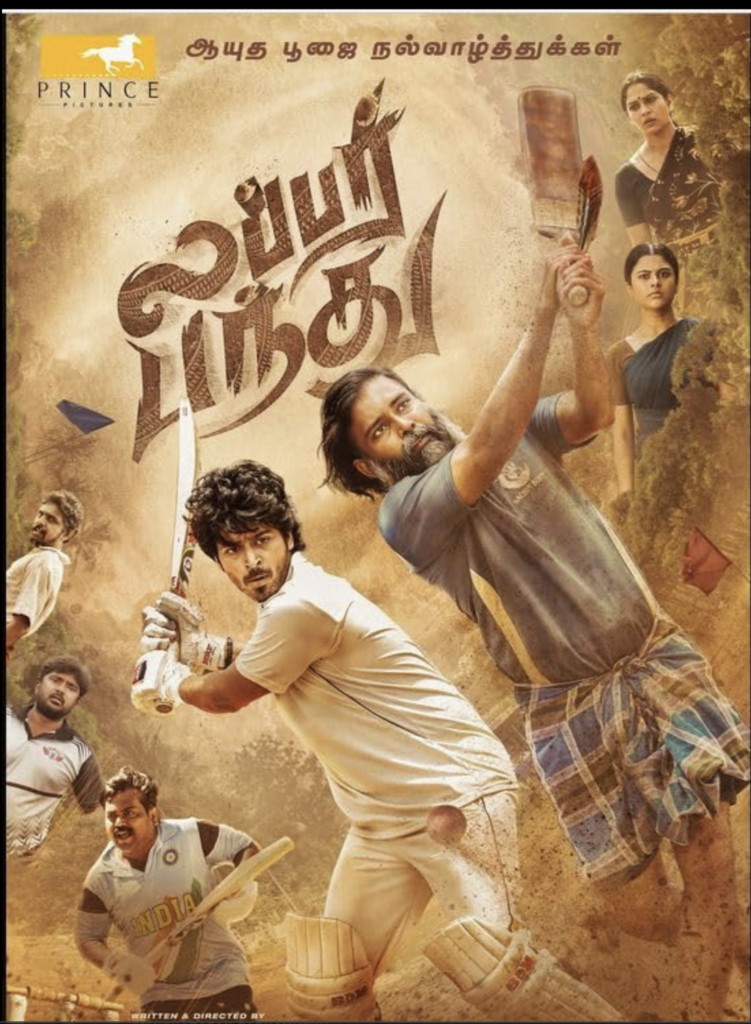“Lubber Pandhu: A Heartfelt Spin on Sports Rivalry and Small-Town Life”

Picture Courtesy : IMDB
The story of Lubber Pandhu begins as a seemingly typical sports drama, focusing on the rivalry between two cricket lovers. Poomaalai, known as Gethu (played by Attakathi Dinesh), is a powerful batsman and a local hero, while Anbu (Harish Kalyan) is an up-and-coming bowler. Gethu, now a married man, sneaks away to play cricket, trying to avoid the disapproval of his wife, Asodhai (Swasika), who loves him but is growing increasingly frustrated with his irresponsible behavior. Meanwhile, a young Anbu, still in school, plays for the local team, Jolly Friends, but isn’t given the chance to bowl due to the influence of dominant caste players.
Years later, cleverly marked by the changing price of a rubber ball, Gethu hasn’t changed much—now sporting grey hair but maintaining his carefree attitude. Anbu, now a sports jersey shop owner, plays as a guest for various teams. The rivalry between the two ignites when a remark Anbu makes about Gethu’s playing style reaches Gethu’s friend. As tensions escalate, Anbu finds himself falling in love with Durga, who, as fate would have it, turns out to be Gethu’s daughter, making their on-field rivalry even more personal.
Lubber Pandhu is a shining example of how thoughtful and layered writing can transform a familiar narrative into something fresh and compelling. The film touches on a range of themes, from cricket mania to caste and gender discrimination, the fragility of the male ego, and the Vijayakanth fandom in small-town Tamil Nadu. Director Tamizharasan Pachamuthu weaves these themes into the story naturally, without ever feeling preachy or forced. His ability to allow the characters and events to speak for themselves is a remarkable achievement for a debut filmmaker. The film maintains its tension throughout, with each resolved conflict giving way to new challenges, keeping the audience engaged. The relationships, particularly between the supporting characters, are fully fleshed out and add depth to the story. The bond between Asodhai and her mother-in-law (expertly portrayed by Geetha Kailasam) and the character arcs of Karuppaiyya (Kaali Venkat) and his daughter are standout examples.
The film also deserves praise for its respectful and nuanced portrayal of its female characters. Even characters with negative traits, like Venkatesh (TSK), a player for Jolly Friends, are presented as real, multi-dimensional individuals shaped by their beliefs and prejudices, rather than stereotypical villains.
This mature storytelling is elevated by excellent filmmaking. Dinesh Purushothaman’s cinematography beautifully captures the dusty cricket grounds and the rustic charm of Gethu’s village, while Madan G’s sharp editing enhances the storytelling. Sean Roldan’s music adds emotional depth, with a subtle score for the heartfelt moments and electrifying compositions for the cricket sequences.
In short, Lubber Pandhu is a delightful, layered film that turns a familiar premise into an emotionally rich and engaging story, marking a highly promising debut for Tamizharasan Pachamuthu.